Abhishek Mande, Sonil Dedhia in Mumbai
Aamir Khan's blockbuster Lagaan was released 10 years ago on this date, June 15. We celebrate the film.
Aamir Khan walks into his study, a sprawling 400-odd sq ft room in the landmark Marina Apartments in Mumbai's Bandra area. He wears a loose black t-shirt, a pair of three-quarters and an air of urgency.
Ten years ago today, Khan's life changed in a way he could have never imagined. It was the day when his debut production Lagaan hit the screens.
It was also the day when quite a few things changed for Bollywood. Lagaan broke practically all the rules so much that Javed Akhtar did everything except physically restrain Aamir from making the movie.
Ten years since it first released, Aamir and his production house have gone from strength to strength. He has never delivered a single flop in these many years and neither has his production house Aamir Khan Productions.
On a laidback Wednesday afternoon, Aamir Khan looks back at the movie and tells Abhishek Mande and Sonil Dedhia how it changed Bollywood forever.
'I was worried that I didn't have time to work on my role as an actor'
Image: A still from LagaanWhen you were about to begin Lagaan, you had films that hadn't done very well including Mann and Mela. What were you thinking as you began your shooting schedule for Lagaan?
I didn't have an unsuccessful film before Lagaan. Mann and Mela did financially well. They were not appreciated by a certain section of the audience but even today in the heartland of India, Mela is a big hit.
What was going though my mind when I began shooting for Lagaan had nothing to do with my other films.
In this case since I was producing it too, there was a lot of stress as a producer. But there were a few thoughts.
First of course was whether we had done the preparation correctly because we were about to start shooting. Effectively, when you start shooting, you have already taken a bulk of the decisions and done the preparation. It is too late to change a bulk of the decisions.
So one of the thoughts was have we done the preparations correctly. Any miss up in the preps would reflect in the shooting and would be too late to change.
Remember this was the first time we were doing a film in one schedule so we couldn't repair anything.
That was why Ashu (Ashutosh Gowariker) and a lot of people told me not to shoot the film in one schedule because if you make a mistake, you can change it in the second schedule.
In a single schedule, you cannot fix a change. So my big question was have we done the preps correctly.
The other big thought in my head was about my uncle (Nasir Husaain) and dad (Tahir Hussain).
They have been filmmakers and producers for the last three decades. This was an important moment for me because I was starting off as a producer.
When they came to Bhuj and saw how we were doing the film, (they realised) it was a scale that they hadn't attempted.
I could see the pride in their eyes. It was an emotional moment for me and they were happy for me and were wishing me well.
The third thing was I was worried that I didn't have the time to work on my role as an actor that I was entering the film under-prepared.
So these were the things I was thinking as I went into the shooting of Lagaan.
'Everyone said Lagaan was brave and audacious'
Image: A still from LagaanWhat would you say makes Lagaan such a great film?
It was a great script and Ashu did a great job at executing as a director.
Additionally, because it was so unusual, path breaking and audacious for Indian cinema it got a stronger reaction.
(Sure) it was a good film (but) there are many good films. What added an aspect to the success of Lagaan was (this element of audacity that made people say) 'What were they thinking when they were making this and they managed to pull it off!'
When we first screened the film in South Africa where a lot of people from the industry were watching it, their reaction was 'Oh god, no one can make a film now'. And I could see it was coming from their heart.
Everyone was telling us that we had no idea what we had just made. Because it was so audacious and large and because we were breaking all rules, the courage that went into the making of the film added to its success.
Yes but what do you think makes it great? Are you equating success to greatness?
What made it great were three things: it was a good script, the way Ashu made it, and the fact that it was something no one would have the courage to make. It is like saying you have made something great but what you've picked is unusual and that is superb.
'After Lagaan people realised that they could attempt anything'
Image: A still from LagaanYou've been born in a 'Bollywood family'. Could you quantify some of the things that changed about Bollywood after the release of Lagaan?
There were a few practical and creative changes that Lagaan brought about in the industry.
After Lagaan, people realised that they could attempt anything. The creative community felt that strongly. Initially there were apprehensions because people (in Bollywood) weren't sure if (something unconventional) would work. So there were a lot of restrictions.
Even the generation of creative people to come -- the youngsters who hoped to get into filmmaking -- saw Lagaan and realised they could dare to dream.
Lagaan told us you could dare to dream that was another big change.
At a practical level, people realised they could do one film at a time.
Today every major production house and (major) actor works that way. The whole system changed after Lagaan.
Sync-sound came in.
After Lagaan, I have not done a single film without sync-sound. All major production houses do sync sound today.
In fact I remember before leaving for the shoot, Adi (Aditya Chopra) and Karan (Johar) met me at a party and told me as that whatever I did I shouldn't do two things: sync-sound and a single schedule shoot because I would get into a lot of trouble.
They warned me that sync-sound would cause a lot of delays and I could see that they were very concerned. But I told them that I wanted to do it. Today they do these very things. (Laughs)
Then there were other little things like getting insurance and security.
Lagaan was the first film which had security on the sets. Until then there was never any security on the set. I was the first producer (who suggested that) we need an agency that provides security -- not only from outside threat but even internally -- fire security or for the safety of the people.
So for the first time we hired Ronit Roy's security agency. Today, every major film has security and is a lock-up set.
'No matter how impossible it may seem, one should follow one's dream'
Image: A still from LagaanWhat would you say have been your major learnings from Lagaan?
My first greatest learning was that no matter how impossible it may seem, one should follow one's dreams.
The second biggest learning probably was that I realised that as a producer don't know a thing about distribution and I don't have the bandwidth to handle it so I need that support and partner for that. So eventually I would (team up with) PVR for Taare Zameen Par and Jaane Tu and UTV.
Satyajit Bhatkal in his book suggests that not a lot of people knew you in Bhuj and the villages where you were shooting. How did you manage the crowds during the '10,000 day'? (The '10,000 day' was the day when they had to bring in 10,000 people for the shooting of the cricket match. It was a huge crowd that threatened to go out of control till Aamir stepped in.)
Well, I have to say that Satya was exaggerating. People did know who I was. The six months that we were in Bhuj, there were 60-100 people standing outside our building every single day.
Even on the '10,000 day' people knew who I was.
'Reena was one of the crucial people on the sets'
Image: A still from LagaanWhat would you say are the challenges of working with a spouse on a movie like Lagaan?
If Reena hadn't joined the film, I would have found it difficult to do Lagaan. I thought she would be a liability because I would have to keep telling her what to do but she was very dynamic as a producer.
She made a list of questions and went to Ashok Thackeria, Subhash Ghai, Indra Kumar, Manmohan Shetty (among others) and understood how films are made. I used to guide her (occasionally). But when she took the reins, she went about very professionally.
There are certain people who were crucial to Lagaan. Reena was one of them.
I didn't have any challenges or problems working with her. In fact I thought she was a great support. I don't think I had any issues and she didn't have any either.
You mentioned the other day that your production house would like to stay away from all awards including the National Awards. Why then does your website include the list of awards and nominations you and your films have received?
(Looks surprised) I must confess I haven't seen my website lately. It must be removed.
'If the film is right, the release date is unimportant'
Image: A still from LagaanAshutosh Gowariker was keen on releasing Lagaan on December 24 but that didn't happen. However three of your biggest hits (Taare Zameen Par, Ghajini and 3 Idiots) that followed were released in the last week of December. Was that where you got the idea?
I don't believe in luck and I don't feel these films would have badly if they had released on any other date.
As far as Lagaan was concerned, Ashutosh was in a hurry. We had completed the shoot in June and were keen on releasing it in December.
In my head and (going by my) experience of the kind of film we had shot and footage we had, my response was 'I don't think we will make it'.
I told him that as far as I was concerned I wanted to see a first cut which works in the next three months. I didn't see it happening. I told him that let's see the first cut by September and only after I have seen the final cut will I think about the release date.
Normally, producers push the director to complete the film and the director asks for more time. Here it was the opposite. I was telling him to get the film right.
(I feel) if the film is right, the date is unimportant. There are of course obvious periods like (the time when schools and colleges have their examinations on) or (the weeks) before Diwali but a date never becomes successful, a film does.
There is nothing sacrosanct about December 24.
'December is logically a good period to release films'
Image: A still from LagaanAnd yet it was you who opened an otherwise untapped big slot of a year -- the last fortnight of December.
(NOTE: Till before Taare Zameen Par the traditional 'big slots' were Diwali and Eid. Taare Zameen Par released December 21 and stole the thunder of Om Shanti Om -- that year's big Diwali release. Ghajini released on December 25, 2008 and 3 Idiots on the same date the following year)
I agree. I was the probably the first one to put my finger on that day. The logic here was that this is the only (other) time when people have holidays. Kids and college-going youth have their vacations. So logically it is a good period.
(It wasn't considered a great slot because) traditionally in the north there tend to be problems like fog and so the last show gets affected but that's weather and your luck. It is as dicey a period as June when it can rain heavily (and affect the film).

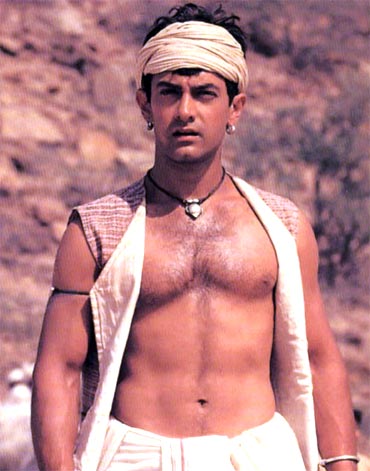
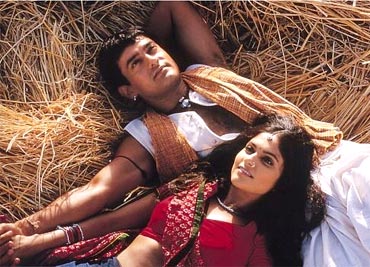
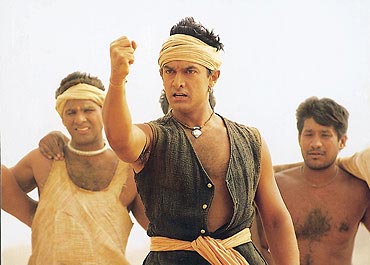
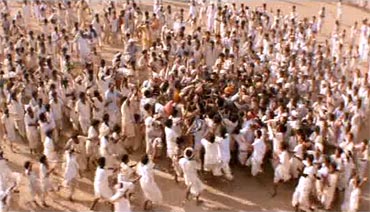
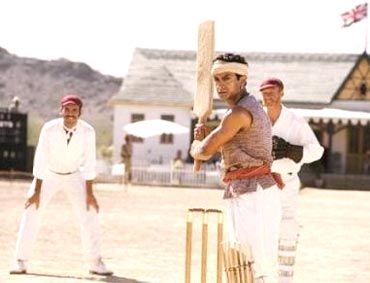
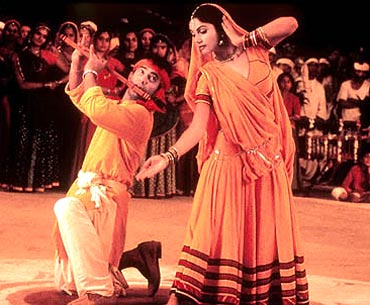
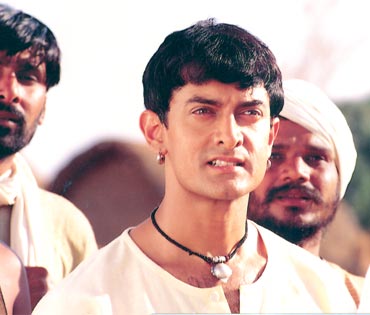
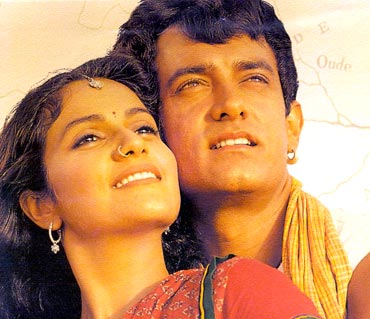
Comment
article